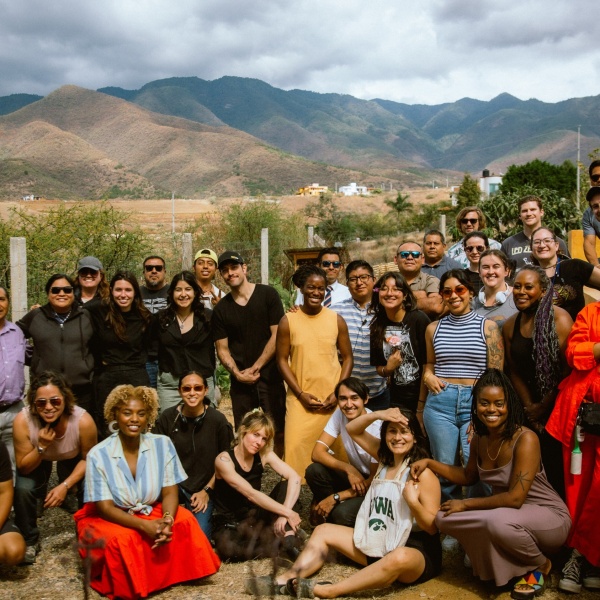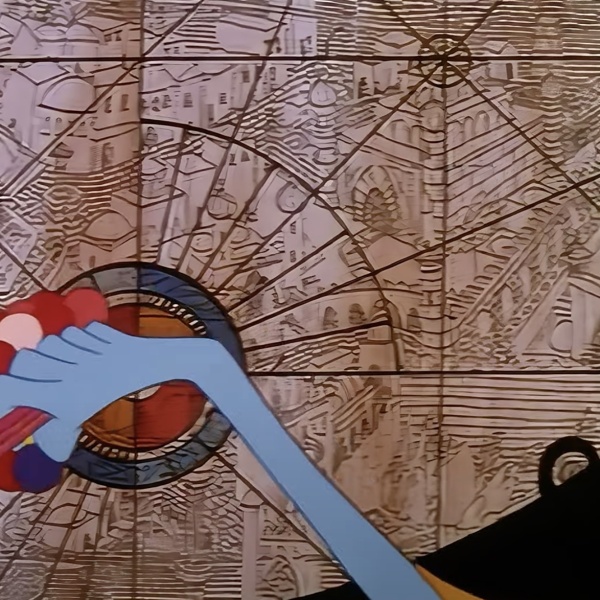
There’s this dream Z (Denée Benton) can’t stop having. She’s standing in a darkness, a void really, but she can see a sliver of light ahead of her. When she gets closer, it becomes a window, or a door, or even a portal. She can see a landscape beyond, sunny and wheat-colored, certainly a place filled with the kind of light and promise that doesn’t exist anywhere else in the void. As she prepares to step into it, into something new and possibly wonderful, she wakes up. Every single time. And every single time, she’s cannot shake one persistent thought: “I think my ancestors are trying to tell me something.”
What that might be — what that might mean — is at the center of Shatara Michelle Ford’s stunning, nearly unclassifiable sophomore feature, “Dreams in Nightmares.” Z is not the only one experiencing the sense that something is wrong in her world, something that goes beyond the nightmare of late-stage capitalism or the fallibility of friendships or the seemingly unshakable racism and sexism that thread through even the most benign of interactions or the persistent pain of generational trauma. Told mostly through Z’s eyes, “Dreams in Nightmares” also follows her best friends Tasha (Sasha Compère), Lauren (Dezi Bing), and Kel (Mars Rucker) as they make their way through a world that proves time and again not to be open to the insights and experiences of femme and queer women of color.
Over the course of the film‘s 127-minute running time, Ford will explore all of that (and much more), tucking major ideas and themes into a nifty new spin on the American road trip movie, one that functions both as an intimate exploration of identity and a rallying cry for a new kind of world. While the potential for that sort of ambition could lead another filmmaker into academic, dry territory, Ford’s film is the opposite: alive, surprising, funny, shocking, and true.
Ford’s feature debut, the perceptive “Test Pattern,” was a standout on the 2021 festival circuit that picked up a number of Gotham and Indie Spirit noms during the fall awards season, and made it clear that Ford was someone to watch. With their second film, Ford rapidly expands on their interests and obsessions for a bigger, bolder feature that demands to be watched. Mostly, Ford offers both deep filmmaking chops — bolstered by continuing fruitful creative partnerships with composer Lia Ouyang Rusli and cinematographer Ludovica Isidori, who both also worked on “Test Pattern” — and a thrilling understanding of character, an increasingly rare combination among our rising filmmaking stars.

Z’s life is complicated and busy enough — she’s got a loving boyfriend (Charlie Barnett) who often shares their bed with a non-binary paramour (Malek Mouzon), while Z is free to explore an attraction with the new woman at her fight class — and that’s before she’s laid off from her adjunct teaching gig at a Los Angeles arts college. Z’s worries about what’s next for her career soon give way to headier concerns: What’s next for her? Where does she belong? Where does any person of color? Any queer person? Any person who is even slightly “different”? Isidori’s camera considers Z as if she was in a horror film, framing her in wide shots that exist to feel both invasive and at a remove, the kind of stuff that sets your teeth on edge, something lurking, something watching, just out of frame.
On the other side of the country, Tasha is dealing with similar struggles in Brooklyn. Despite her shiny MBA, Tasha has also been laid off from her job — “last in, first out” — an added stress for a person who already feels stretched to her breaking point. Tasha’s roommate Lauren (in her first screen role, Bing is a charisma machine) is working multiple jobs just to scrape by, and while Tasha might have initially offered her close pal her second bedroom at a pittance, her goodwill has run out. Z, Tasha, and Lauren became fast friends in college — all of them artsy and creative, in addition to identifying as Black queer femmes — and while they all give off distinctly different energies, it’s easy to see why they gravitated toward each other, and still do, even a decade later. (A series of beautiful close-up shots, many of which gently break the fourth wall, assist in helping the audience feel close to them as well.)
Money problems aren’t the only issue bonding the trio, however, there’s also the lingering question of where the fourth member of their group has gone, and why Kel hasn’t reached out to their three closest friends in months. When Z, Tasha, and Lauren decide to embark on a road trip, one that will take them from Pittsburgh to Iowa City to Kansas City and beyond, their initially giddy decision hides a grim possibility: they’re going to look for Kel, and they might not find them. That tension, that terror, weaves its way through a series of interactions that only serve to underline what there actually is to fear out there. Which is to say, a lot.

Not that there’s no joy or humor to be found along the way. The trio’s first stop in Pittsburgh ends in a visit to a live performance where they’re gifted both drag and poetry, vibrant works that punctuate the deepest questions of the film. When they travel to Iowa City, Kel’s last known residency, their ex-girlfriend Sabrina (a delightfully unhinged Jasmin Savoy Brown) throws a truly terrible dinner party that mostly seems like an excuse for her to show off the life she’s made for herself (as a student of the vaunted Iowa Writers’ Workshop, of course) without Kel.
But even in these energetic sequences, Ford directs us toward the central problem of “Dreams in Nightmares”: No one, it seems, is able to ask each other a straight question. But is that because they don’t want to hear the answer or because they’re unable to face it for themselves? Sabrina’s outlandish behavior keeps the trio at bay, constantly rebuffing them from even asking the one thing they’re desperate to know: Where is Kel? When the trio end up in Kansas City with Kel’s parents (Regina Taylor and Robert Wisdom), that disconnection and lack of communication only continues, and the question hangs even heavier. Where is Kel? Where in this world could they possibly be?
While the often dreamlike nature of some of Ford’s most thrilling sequences might hint at a more open-ended conclusion, what proves to be truly exciting about the film and Ford’s approach to it is the answers it does provide. Ford’s radical ideas and ideals reach a head in the film’s final act, as the road trip takes a new detour and finds still more surprises ahead. Z’s dream finds its answer, but the journey there proves to be more edifying, the kind that opens up a window, or a door, or even a portal to something much greater.
Grade: A-
“Dreams in Nightmares” premiered at the 2024 BlackStar Film Festival. It is currently seeking U.S. distribution.





